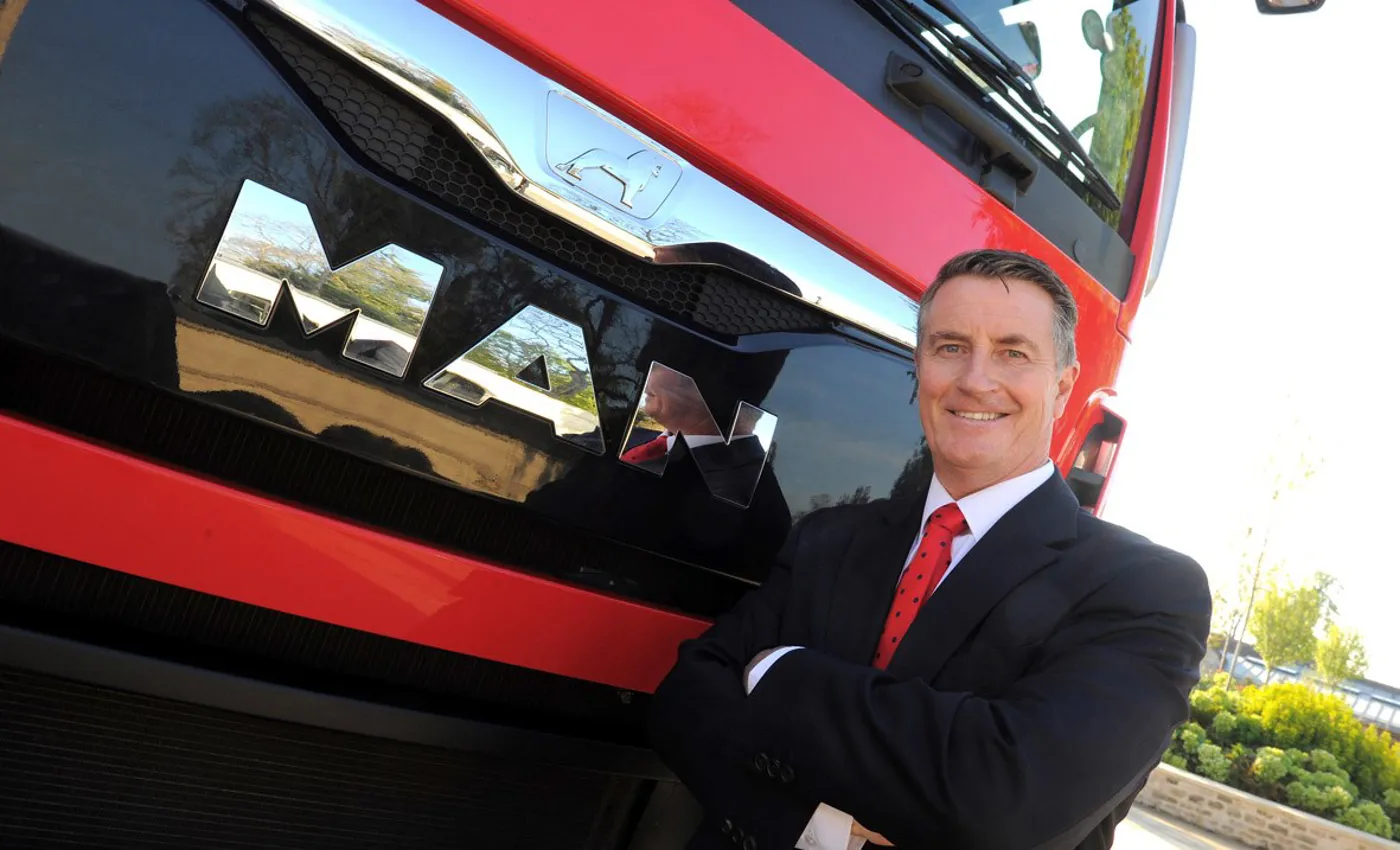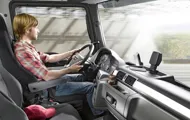What a difference a year makes. In 2014, MAN Truck & Bus UK was – in its own words – a company “on its knees”.
Now it is buzzing, with sales up 48% in the first quarter of 2015 and a new strategy to steer the company up the truck sales charts. So what changed?
The turnaround in fortunes can be traced back to the appointment of Simon Elliott as chief executive in September last year.
Elliott is one of the more colourful and outspoken characters in the automotive industry, with a long history of successful campaigns to improve the performance of companies he has worked for.
He led Volkswagen’s van business in the UK from 2009 to 2012, during which time it overtook Vauxhall to take the number two sales position behind market leader Ford.
He then moved to Ireland to head up Volkswagen Group. During his time there, Volkswagen claimed the number one sales slot.
Factfile
Chief executive: Simon Elliott
Time in role: 8 months
2014 truck sales: 3377 units
2014 truck market share: 9.7%
Key MAN models: TGX 26.560 6x2/2 BLS tractor, TGX 26.440 6x2/2 BLS tractor, TGS 24.440 6x2/2 BLS tractor, TGS 35.400 BB 8x4 tipper, TGS 26.360 6x2-2 BL rigid, TGM 18.250 4x2 BL rigid, TGL 7.180 4x2 BB rigid
Size of dealer network: 68 locations
Elliott is the first to admit he’s completely new to the truck business, but he recognised that MAN, as part of the Volkswagen Group, badly needed a fresh strategy.
When the offer came from Volkswagen bosses late last year, he grabbed the chance to put things right. He has wasted no time getting to grips with the business – despite receiving a shock when he turned up at the company’s Swindon head office on day one.
“When I took over I gave myself 100 days to form a new strategy at MAN, but I was amazed how bad things were when I got here,” Elliott says.
“The firm was on its knees and it has taken me until now to start pressing the right buttons for the lights to come on again. There is a huge opportunity to develop the business and I am relishing the challenge.”
Fortunately, one of the things that wasn’t a problem was the product itself. MAN’s four models – from 7.5-tonne to 44-tonne – are a match for any opposition with, claims Elliott, class-leading fuel consumption and the lowest AdBlue usage of any trucks on sale in the UK.
“We want to be seen as the most desirable brand in the market and we just aren’t shouting loud enough at present about how good our products are,” he says.
“Old customers who left us are already coming back to us because they have heard we are on the up again.”
So what is the new brand strategy? First, Elliott realised MAN staff were not talking to enough potential customers.
“There were huge opportunities and we weren’t even scratching the surface,” he says.
MAN is now recruiting up to 100 employees to grab every opportunity that presents itself.
Second, staff morale was low so Elliott has been busy instilling his personable management style into the business, so staff will be proud to wear the MAN badge.
“Under my guidance, staff now come into work with a smile on their faces and this will reflect in the way they do business,” he says. “I have also cut back on administration, so it doesn’t take 15 signatures on a piece of paper before we can take on new staff.”
He has also been busy on the dealer front, attending a dealer conference in Dublin recently to explain what was expected of them under his new management strategy. Dealers came away motivated and with a much clearer vision of where the brand was heading.
Elliott believes the driver shortage plaguing the industry (Commercial Fleet, April 2015) will result in truckers becoming much more involved in choosing which models their employer buys.
“From the driver’s perspective, we want them to think of MAN as the number one desirable brand,” he says.
To this end, MAN is concentrating on making itself better known in the truck world. It will be exhibiting at Truckfest in Peterborough this spring after an absence from the show and is also sponsoring darts player James Wade.
MAN is also about to launch an advertising campaign, which will focus on the wives and families of truck drivers rather than the trucks themselves. The company is active on Facebook and Twitter and claims to be the fastest-growing brand on Facebook in 2015.
“We looked at other truck adverts and they all said the same thing and were pretty boring,” says Elliott.
“We want to be different and we want to be talked about, not just within the industry.”
One thing that puzzles industry pundits is why manufacturers do not tie in their car, van and truck businesses so fleets can sign up for solus deals with a single contract.
For example, Volkswagen Group could offer everything from Volkswagen, Audi, Škoda and Seat cars to Volkswagen vans and MAN trucks.
Elliott is aware of this problem, but fears the solution is not as simple as it may sound.
“More and more of the truck customers we are talking to ask us about buying cars and vans too,” he says. “All I can do at present is to pass this information on to the various fleet teams and get them to follow the leads up.
“I realise it isn’t a good enough situation and I’d love to be able to offer solus deals with a single contract. At present it just isn’t possible. However, I am very aware of the problem and it is something I am in discussion about at the top level of the firm.
“In the long term I think we will eventually offer solus deals on everything from small cars to 44-tonne trucks.”
Sales director Ian Mitchell, who joined the company in January, is unsurprisingly upbeat about the new strategy.
“MAN was not realising its full potential and not punching its weight – which means there is a great opportunity to make it more successful,” he says.
“We are starting to get MAN back on the tongues of fleet operators, who are now all talking about us and our new direction.”
Mitchell is also planning to boost sales of MAN used vehicles under its TopUsed scheme. A greater emphasis on selling used trucks through MAN dealerships will enable the company to have a much tighter control on where they were going and what prices they made – and thus residual values generally should rise as a result.
“MAN is now a serious contender in the used truck market,” Mitchell says. “RVs will go up as a result and the whole business should get a more positive feel to it.”
Elliott is looking for MAN to achieve an 11% market share this year, an ambitious figure given that it was just 7.22% as of last month. The company is in sixth place in the 6.0-tonne-and-above truck sector, behind DAF, Mercedes-Benz, Scania, Volvo and Iveco.
However that market share aspiration is just the start. Although he declines to put a date on when it may happen, Elliott’s ultimate goal is a top three place in the sales chart.



















Login to comment
Comments
No comments have been made yet.